Remembering Holger Czukay-Five Essential Albums
John Diliberto 4/17/2018
We’re featuring Holger Czukay, Tuesday, April 17, on a special Echoes half hour that will include an interview with the idiosyncratic musician. That interview will also be in the April 26 Podcast.
 Before samplers and computers; before rap and electronica; before ambient and new exotica, Holger Czukay was doing it all. A student of Karlheinz Stockhausen and a founding member of Can, the German avant-progressive rock group, the sound of Holger Czukay presaged much of what we take for granted in music today. He continued until the end of his life in September, 2017, pushing at the seams and pulling at the threads of music.
Before samplers and computers; before rap and electronica; before ambient and new exotica, Holger Czukay was doing it all. A student of Karlheinz Stockhausen and a founding member of Can, the German avant-progressive rock group, the sound of Holger Czukay presaged much of what we take for granted in music today. He continued until the end of his life in September, 2017, pushing at the seams and pulling at the threads of music.
Every generation kicks up its music eccentrics, artists like John Cage, Ornette Coleman, Harry Partch and Captain Beefheart, who hear music differently from most of us, and who ultimately change the way we listen. Holger Czukay should have easily moved to the highest echelons of that list. He was a member of the seminal German rock group called Can and launched a quirky solo career that has drawn people such as David Sylvian, Brian Eno and Jah Wobble into his elliptical orbit for collaborations.
 In the late 1990s, Holger Czukay and Can experienced a revival of sorts, rediscovered by the techno-generation as progenitors of cut & paste sampling techniques and by more experimental rockers as free-form explorers of improvisational space. Can and Czukay are cited by artists ranging from The Orb to Tortoise to John Lydon. Mute Records released Sacrilege, an album of Can re-mixes that includes Brian Eno reconstructing “Pnoom,” The Orb dissecting “Halleluwah” and Sonic Youth attacking “Spoon.” Talking to the psychedelic trio, Khruangbin, their eyes lit up when I mentioned Can as an influence. In the 21st century, Kanye West sampled Can.
In the late 1990s, Holger Czukay and Can experienced a revival of sorts, rediscovered by the techno-generation as progenitors of cut & paste sampling techniques and by more experimental rockers as free-form explorers of improvisational space. Can and Czukay are cited by artists ranging from The Orb to Tortoise to John Lydon. Mute Records released Sacrilege, an album of Can re-mixes that includes Brian Eno reconstructing “Pnoom,” The Orb dissecting “Halleluwah” and Sonic Youth attacking “Spoon.” Talking to the psychedelic trio, Khruangbin, their eyes lit up when I mentioned Can as an influence. In the 21st century, Kanye West sampled Can.
It was Holger Czukay that sent can to the outer limits and you could hear that once he started making solo albums. He was a wildly eclectic and eccentric musician who fell outside just about any category you can come up with. That also means that his music wasn’t always easy to wrap your ears around. I recall buying his solo debut, Movie, when it came out in 1979. I returned it after a couple of listens. But six months later, I found an entry into his Dadaesque world and Movie became one of my favorite albums. It was this recording that established Czukay’s cut & paste techniques that he got from Stockhausen compositions like “Gesang der Junglinge” and “Hymnen.” He’d sample voices off shortwave radio, lift dialog from old films and even resample his own work and Can’s. His mix of hipster lounge exotica on “Cool in the Pool” countered by the epic expanse of “Hollywood Symphony” made Movie my first pick for essential Holger Czukay CDs.
The second is his second album, On the Way to the Peak of Normal. It’s 37 minutes of ecstatic non-sequitor bliss. When we visited Czukay’s Cologne apartment in 1982, he had a giant, outdoor TV antenna in his dining room. He wasn’t using it to get better reception. It was draped with hundreds of tape loops and tape snippets that comprised songs like “Ode to Perfume” from On the Way to the Peak of Normal. Songs like “Fragrance” took you into a smoke filled world full of twangy electric guitars, swampy rhythms, electronic sounds that bent your head in and out of the groove and elliptical lyrics.
 Another album from the early years would be Full Circle, composed with Can drummer Jaki Liebezeit and bassist Jah Wobble, who at the time was working in Public Image, Ltd. It’s zen-dub hipsterism at its best, with Liebezeit’s motoric rhythms and Wobble’s hypnotic bass anchoring you through the title track and the spooky “Twilight World.”
Another album from the early years would be Full Circle, composed with Can drummer Jaki Liebezeit and bassist Jah Wobble, who at the time was working in Public Image, Ltd. It’s zen-dub hipsterism at its best, with Liebezeit’s motoric rhythms and Wobble’s hypnotic bass anchoring you through the title track and the spooky “Twilight World.”
Leaping forward, I was taken by the more song oriented spaces of Good Morning Story from 1999. It mixes cut-up jam sessions and bizarre dialogs centered by Jaki Liebezeit’s metronomic drums and the voice of Czukay’s wife, U-She, a really good singer when she wasn’t eerily channeling Nico.
Holger has done some of his most accessible work with David Sylvian, contributing immensely to his albums, Brilliant Trees and Words with the Shaman. But I would point to their collaboration Flux & Mutability, for it’s subversively soothing textures and surreal sound designs.
Finally, you can’t have a complete Holger Czukay collection without some Can. Critics tend to cite their earlier works with whacked out singers Malcolm Mooney and Damo Suzuki. You have to be in the right state of mind to experience albums like Monster Movie and Tago Mago. The records that really sold me on Can were some middle period recordings, Soon Over Babaluna and Landed. Kinetic grooves, lacerating guitar from Michael Karoli and Holger’s throbbing bass and hallucinogenic engineering make these albums classics of post-psychedelia.
 You can now get the best of Holger Czukay and then some on a new collection called Cinema, It’s a five CD/LP boxed set that includes most of the titles I’ve mentioned here except for the Can and Sylvian tracks. It also includes several unreleased tracks. Among them is Czukay’s brief stab at jazz and a track using the voice of Stockhausen.
You can now get the best of Holger Czukay and then some on a new collection called Cinema, It’s a five CD/LP boxed set that includes most of the titles I’ve mentioned here except for the Can and Sylvian tracks. It also includes several unreleased tracks. Among them is Czukay’s brief stab at jazz and a track using the voice of Stockhausen.
I saw Holger Czukay play New York’s Knitting Factory in 1997 to a packed SRO room. I also saw him play the TLA in Philadelphia in 2004 to about 5 people. That was wrong. A musician who has never fit into easy popular or critical pigeon-holes, Holger Czukay made people like Thom Yorke and Trent Reznor seem like corporate cogs.
Holger Czukay prefered to be the wrench in the machine. He enjoyed his status as a homunculus in the Id of pop music. “I did an interview with German MTV and at the end I asked the director of the station if they had a chief editor. He said, ‛No.’ I said, ‛Take me. I can make your station very successful. Don’t play anything that I like and you’ll become very successful.’”
Damn. I knew that was the problem with Echoes.
Five Essential Holger Czukay Albums
1-Movies
2-On the Way to the Peak of Normal
3-Full Circle
4-Good Morning Story
5-Flux & Mutability
Two Can Albums to Get if You Don’t Get Can
1-Soon Over Babaluma
2-Landed
